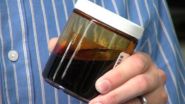(Press-News.org) Finnish researchers have found that the low-expression variant of fatty acid-binding protein 4 (FABP4), which is particularly common among Finns, reduces the risk of heart attack and stroke. The finding revealed a promising new way to customise a potentially preventive drug for atherosclerosis.
Led by Professor Perttu Lindsberg, the long-term research project of the Department of Neurology at the Hospital District of Helsinki and Uusimaa (HUS) focuses on carotid atherosclerosis. It is a joint effort involving the University of Helsinki, the Helsinki University Central Hospital, the Wihuri Research Institute and the National Institute for Health and Welfare. The findings were published in the highly esteemed scientific journal Circulation: Cardiovascular Genetics.
The research indicates that people who have inherited the genetic variant reducing the expression of FABP4 from both parents have eight-fold lower odds for myocardial infarction than the rest of the population.
The researchers also found that patients with carotid stenosis who carried the protective gene variant suffered from brain ischemia three times less frequently than carotid stenosis patients without the gene variant.
"It could be that reduced cell stress in the stenosis, attenuated inflammation, as well as reduced accumulation of cholesterol and other lipids in the arteries help keep atherosclerosis asymptomatic among the gene carriers," explains Jani Saksi, a researcher in the Molecular Neurology Research Program at the University of Helsinki.
Tests on laboratory animals have previously shown that an orally ingested drug suppressing FABP4 activity effectively slows down the progression of atherosclerosis and even reduces existing stenoses. The phenomenon has not yet been studied in humans.
The Finnish study is the first to detect a link between the FABP4 variant and lower total cholesterol levels in the blood. The decrease in serum total cholesterol levels was the most pronounced in obese subjects who had inherited the gene variant from both parents. In fact, obese carriers of the gene variant show fewer clinical markers of early atherosclerosis and lower levels of stenosis than the rest of the population.
"These findings suggest that FABP4 could be a new potential target for drug development aiming to prevent lethal and disabling myocardial and cerebral infarctions induced by atherosclerosis," says Saksi. "The inhibition of FABP4 activity – especially among obese people in the risk group for atherosclerosis – may prove to be an important method for reducing these individuals' risk for cardiovascular diseases."
INFORMATION: END
A novel pathway for prevention of heart attack and stroke
2014-08-21
ELSE PRESS RELEASES FROM THIS DATE:
Feeling bad at work can be a good thing (and vice versa)
2014-08-21
LIVERPOOL, UK – 05 August 2014: Research by the University of Liverpool suggests that, contrary to popular opinion, it can be good to feel bad at work, whilst feeling good in the workplace can also lead to negative outcomes.
In a Special Issue published in Human Relations, Dr Dirk Lindebaum from the University's Management School, together with his co-author Professor Peter Jordan, developed a new line of study, and commissioned research to further explore the role of emotions in the workplace.
They found that the commonly-held assumption that positivity in the workplace ...
Counselling has limited benefit on young people drinking alcohol
2014-08-21
Counselling techniques used to help young people with drinking problems may be of limited benefit, a new study suggests. In a systematic review published in The Cochrane Library, researchers found that an approach known as motivational interviewing did not substantially reduce drinking or alter alcohol-related behaviour.
Globally every year, around 320,000 young people between the ages of 15 and 29 die as a result of alcohol misuse. Most of these deaths are due to car accidents, murders, suicides or drowning. Motivational interviewing is a counselling technique developed ...
Regular blood transfusions can stave off repeat strokes in children with sickle cell disease
2014-08-21
Monthly blood transfusions can substantially reduce the risk of recurrent strokes in children with sickle cell disease (SCD) who have already suffered a silent stroke, according to the results of an international study by investigators at the Johns Hopkins Children's Center, Vanderbilt University and 27 other medical institutions.
Results of the federally funded research described in the Aug. 21 issue of The New England Journal of Medicine, show that children with preexisting silent strokes who receive monthly transfusions have 58 percent lower risk of suffering repeat ...
NEJM Perspective: 'Studying 'Secret Serums' -- Toward Safe, Effective Ebola Treatments'
2014-08-21
WASHINGTON – Conducting clinical studies of agents to treat Ebola and allowing compassionate use of those agents are not necessarily mutually exclusive, writes Georgetown University Medical Center's (GUMC) Jesse L. Goodman, M.D., M.P.H., in a perspective piece published Wednesday in the New England Journal of Medicine.
In "Studying 'Secret Serums' — Toward Safe, Effective Ebola Treatments," Goodman describes the Ebola virus as "one of the world's most feared pathogens." The latest Ebola outbreak that began in West Africa in Dec. 2013 has infected more than 2,200 people ...
Imaging study reveals white-matter deficits in users of codeine-containing cough syrups
2014-08-20
Aug. 20, 2014 -- An imaging study of chronic users of codeine-containing cough syrups (CCS) has found deficits in specific regions of brain white matter and associates these changes with increased impulsivity in CCS users.
Researchers used diffusuion tensor imaging (DTI) (an MR imaging technique), coupled with fractional anisotropy, to investigate the white matter integrity of chronic CCS users. Deficits were found in multiple regions of the brain, including the inferior fronto-occipital fasciculus, which other studies have found to be abnormal in other forms of addiction, ...
High school students discover stars at SMU research program
2014-08-20
DALLAS (SMU) – Two Dallas high school students discovered five stars as members of a Southern Methodist University summer physics research program that enabled them to analyze data gleaned from a high-powered telescope in the New Mexico desert.
All five stars discovered by Lake Highlands High School seniors Dominik Fritz and Jason Barton are eclipsing contact binary stars, pairs of stars that orbit around each other so closely that their outer atmospheres touch. As the stars eclipse, they dim and then brighten as one emerges from behind the other. These stars are categorized ...
Ozone-depleting compound persists, NASA research shows
2014-08-20
VIDEO:
This NASA video discusses new research that shows Earth's atmosphere contains an unexpectedly large amount of an ozone-depleting compound from an unknown source decades after the compound was banned worldwide....
Click here for more information.
NASA research shows Earth's atmosphere contains an unexpectedly large amount of an ozone-depleting compound from an unknown source decades after the compound was banned worldwide.
Carbon tetrachloride (CCl4), which was once used ...
Blueprint for next generation of chronic myeloid leukemia treatment
2014-08-20
SALT LAKE CITY— Researchers at Huntsman Cancer Institute (HCI) at the University of Utah have identified and characterized mutated forms of the gene that encodes BCR-ABL, the unregulated enzyme driving the blood cancer chronic myeloid leukemia (CML). According to the American Cancer Society, nearly 6,000 new cases of CML will be diagnosed in 2014.
Drugs already in use, called tyrosine kinase inhibitors (TKIs), target BCR-ABL and are effective at controlling the disease. They do not cure CML but control it in a way that allows patients to get back to normal life and a ...
Water leads to chemical that gunks up biofuels production
2014-08-20
RICHLAND, Wash. -- Trying to understand the chemistry that turns plant material into the same energy-rich gasoline and diesel we put in our vehicles, researchers have discovered that water in the conversion process helps form an impurity which, in turn, slows down key chemical reactions. The study, which was reported online at the Journal of the American Chemical Society, can help improve processes that produce biofuels from plants.
The study examines the conversion of bio-oil, produced from biomass such as wood chips or grasses, into transportation fuels. Researchers ...
Salmon forced to 'sprint' less likely to survive migration
2014-08-20
Sockeye salmon that sprint to spawning grounds through fast-moving waters may be at risk, suggests new research by University of British Columbia scientists.
When salmon encounter turbulent, fast-moving water – such as rapids or areas downstream of dams – they must move upstream using a behaviour known as "burst swimming" that is similar to sprinting for humans.
"Days after sockeye passed through extremely fast-moving water, we started to see fish dying only a short distance from their spawning grounds," said Nicholas Burnett, a research biologist at UBC and lead author ...


